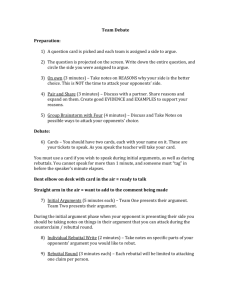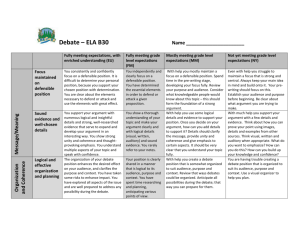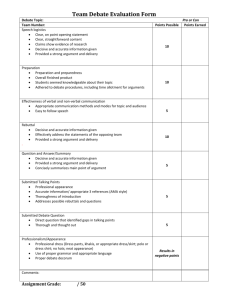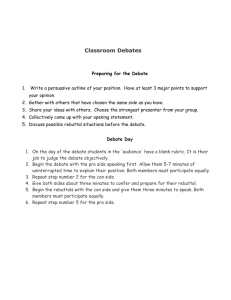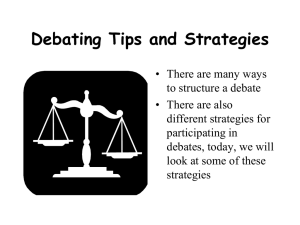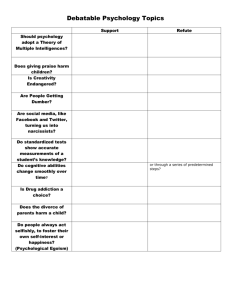Debate sample assignment guidelines for weight management course
advertisement
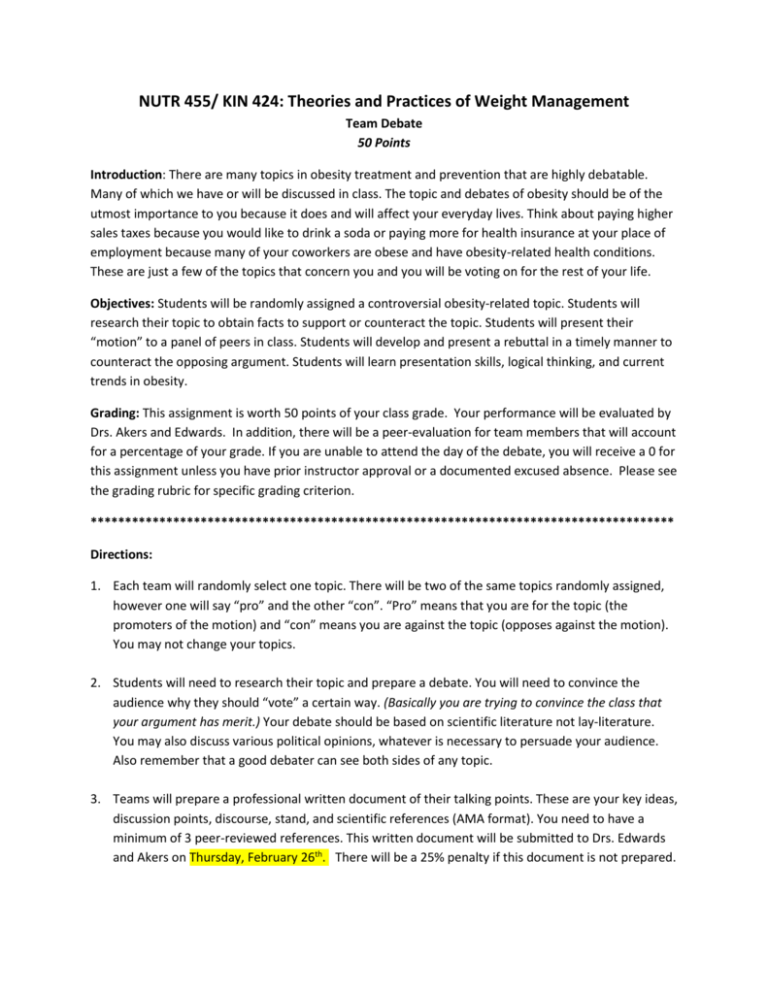
NUTR 455/ KIN 424: Theories and Practices of Weight Management Team Debate 50 Points Introduction: There are many topics in obesity treatment and prevention that are highly debatable. Many of which we have or will be discussed in class. The topic and debates of obesity should be of the utmost importance to you because it does and will affect your everyday lives. Think about paying higher sales taxes because you would like to drink a soda or paying more for health insurance at your place of employment because many of your coworkers are obese and have obesity-related health conditions. These are just a few of the topics that concern you and you will be voting on for the rest of your life. Objectives: Students will be randomly assigned a controversial obesity-related topic. Students will research their topic to obtain facts to support or counteract the topic. Students will present their “motion” to a panel of peers in class. Students will develop and present a rebuttal in a timely manner to counteract the opposing argument. Students will learn presentation skills, logical thinking, and current trends in obesity. Grading: This assignment is worth 50 points of your class grade. Your performance will be evaluated by Drs. Akers and Edwards. In addition, there will be a peer-evaluation for team members that will account for a percentage of your grade. If you are unable to attend the day of the debate, you will receive a 0 for this assignment unless you have prior instructor approval or a documented excused absence. Please see the grading rubric for specific grading criterion. ************************************************************************************* Directions: 1. Each team will randomly select one topic. There will be two of the same topics randomly assigned, however one will say “pro” and the other “con”. “Pro” means that you are for the topic (the promoters of the motion) and “con” means you are against the topic (opposes against the motion). You may not change your topics. 2. Students will need to research their topic and prepare a debate. You will need to convince the audience why they should “vote” a certain way. (Basically you are trying to convince the class that your argument has merit.) Your debate should be based on scientific literature not lay-literature. You may also discuss various political opinions, whatever is necessary to persuade your audience. Also remember that a good debater can see both sides of any topic. 3. Teams will prepare a professional written document of their talking points. These are your key ideas, discussion points, discourse, stand, and scientific references (AMA format). You need to have a minimum of 3 peer-reviewed references. This written document will be submitted to Drs. Edwards and Akers on Thursday, February 26th. There will be a 25% penalty if this document is not prepared. 4. Your team will be randomly assigned to thoroughly review another team’s talking points and create a question to ask them during their debate. Drs. Edwards and Akers will post the talking points on your team’s Canvas site for you to view. Please remember to be detailed with your question but do not make them so difficult that they cannot be answered. This is not a narrative but a question from a gap in their talking points. Your team will submit your question on Monday, March 2nd by 5:00pm. There will be a 10% penalty if your question is not submitted. An example of a good question is below: a. “In your debate you state that obesity is a preventable risk factor for other diseases and conditions, and is not a disease itself. How would you classify the 50-55% of individuals that have genetic heritable links to obesity genes? Please defend your answer.” 5. Your team will prepare a three minute discourse to present to the class. This speech should be clear, concise, and insightful. You need to convince the audience that your stand is the “right” stand. Once your team is finished with your speech, the other team will present their side of the argument. All team members do not have to speak in front of the class, however, all have to participate in the assignment. 6. Once both teams have presented their argument, each team will have one minute to prepare a rebuttal. A rebuttal is where you must present a case against arguments your opponent has made. Please see the rebuttal tips at the end. After the minute deliberation with your team, you will have one additional minute to present you rebuttal. 7. After the rebuttal a peer team will ask a question to the debating teams. Each team will have one minute to prepare the best answer to the question. After the minute deliberation with your team, you will have one additional minute to answer the question and wrap up your side of the argument. 8. Each individual will fill out a peer-evaluation for each member of the team. Please use the peerevaluation form provided. The peer-evaluation will be due on 3/6. This will account for a percentage of your grade. Note: Debates will be held on 3/3 and 3/5. We look forward to a heated debate! But please no low blows, punches, or shoe throwing at other debaters Debate and Rebuttal Tips: Know your team's case inside out. If the debate is prepared, you should be reading and rereading your teammates' speeches and improving them as a team. Brainstorm as much as you can. Be prepared and practice your speech. Never let anybody write your speeches for you. This will prevent you from knowing what you're talking about; let alone what the rest of your team is talking about. Work with your teammates to have the strongest argument. Plug holes in your speech before they are exploited. If you can see an opportunity where your opponent will attempt to rebut, they will see it too. For example, if you are advocating Policy A over Policy B, and you say Policy A is more costly, make sure you add a disclaimer, such as "Even though Policy A costs more, the superior quality is well worth the cost". This way, your opponents may not even try to rebut that point at all, and if they do, you've set the basis for an easy rebuttal. Get into the mindset of your opponents. Sometimes it can be useful to pretend you have been allocated to the other side of the debate, and try to get into the opponents' minds. Does policy B have better return rates? A lower cost? Write down as many of these rebuttals as possible, and how you plan to counter them. If you can walk into a debate with a few semi-prepared rebuttals, it makes your job so much easier. Know your opponent's case! The first speaker of the opposing team will outline the arguments their entire team will make. Write these down quickly, and then pay keen attention to the rest of their speech. You must take in as much information from them as is possible. Find something that's wrong with their argument. Do they contradict themselves? Are they cherrypicking arguments? Can you counter a hypothesis of theirs with facts? An opponent's argument is NEVER airtight. Write down anything and everything that you could use for a rebuttal. Prepare a rebuttal palm card. A useful format is to write do an opponent’s argument. Then you can use a paraphrased form of what they said, and a dot-point that you will use to rebut. Order your palm cards by importance. Relax, and pretend you're elsewhere. Try thinking you are having a conversation with an argumentative friend, or better yet, a teacher. Be polite, and be formal, but above all, relax. This will make it a lot easier to recite your argument and be confident. Speak off the top of your head. Once you've exhausted whatever is written on your palm card, you treat the rebuttal as you would an ordinary conversation. When you talk to your friends, you don't think about what you're saying beforehand, do you? It just comes out. Try to position your mind so that you are having a conversation, and it will become much easier to give impromptu rebuttals. Be confident. In a debate, nothing is worse than a person who clearly thinks the other team is smarter, better or winning. You're winning, and you just proved it with your rebuttal. Be proud of what you have achieved. Use analogies. Get used to using analogies or hypothetical situations. They are a fantastic tool to have in your arsenal, not only because they are effective, but also because they take up more time than a oneliner will. Use them sparingly, however. Use research to back your argument or rebuttal up. Don't forget about 'technical' rebuttals. If you and the other team disagree on the definition of the topic, make sure you continue to address why your definition is correct and theirs isn't. If they forget to address it, this can win you easy points. Know not only useful facts, but also their origin. You can often use these to completely contradict an opponent's argument. There is nothing more humorous than putting an opposing team in their place with accurate facts that is backed up from credible sources. Attack the opposing team's arguments, not the opposing team themselves. Never, ever, admit you were wrong. If you don't have a counterattack for their rebuttal, don't address it at all.
